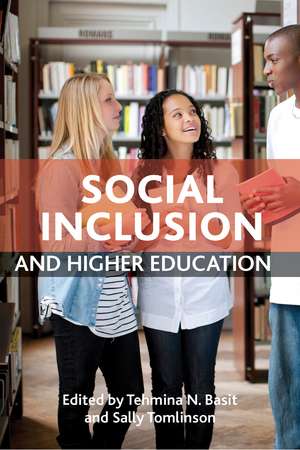Social Inclusion and Higher Education
Autor Tehmina N Basiten Limba Engleză Hardback – 24 ian 2012
As higher education has made deliberate strides in recent decades to become more inclusive and accessible, the number of students from non-traditional backgrounds has increased dramatically. There has been much study of the effects of higher education on previously underserved populations, showing that it can lead to higher lifetime income and higher status. But there has been little research on what happens to those students once they are in a university. This book fills that gap, taking a close look at this issue and drawing on case studies from the United States, the United Kingdom, and Australia to illuminate the problems that face non-traditional students, the resources they and their families are able to draw on, and the ways that administrators and staff can help them succeed. This paperback edition is well suited to postgraduate students and practitioners and alike.
Preț: 834.91 lei
Preț vechi: 1084.29 lei
-23% Nou
Puncte Express: 1252
Preț estimativ în valută:
159.76€ • 174.08$ • 134.62£
159.76€ • 174.08$ • 134.62£
Carte tipărită la comandă
Livrare economică 23 aprilie-07 mai
Preluare comenzi: 021 569.72.76
Specificații
ISBN-13: 9781847427977
ISBN-10: 1847427979
Pagini: 328
Dimensiuni: 162 x 239 x 24 mm
Greutate: 0.66 kg
Ediția:New.
Editura: Bristol University Press
ISBN-10: 1847427979
Pagini: 328
Dimensiuni: 162 x 239 x 24 mm
Greutate: 0.66 kg
Ediția:New.
Editura: Bristol University Press
Notă biografică
Tehmina N. Basit is professor of education and director of the Institute for Education Policy Research at Staffordshire University. Sally Tomlinson is emeritus professor of education at Goldsmiths College, London University and senior research fellow in the Department of Education, University of Oxford, as well as a visiting professor at the University of Wolverhampton, England.
Cuprins
Foreword by David Watson
Notes on contributors
Introduction
Sally Tomlinson and Tehmina N. Basit
Part One: Issues in social inclusion
1. Capitals, ethnicity and higher education
Tariq Modood
2. Widening participation from an historical perspective: increasing our understanding of higher education and social justice
David W. Thompson
3. Broadening participation among women and racial/ethnic minorities in science, technology, engineering and maths
Terrell L. Strayhorn, James M. DeVita and Amanda M. Blakewood
4. Social inclusion in a globalised higher education environment: the issue of equitable access to university in Australia
Richard James
5. From minority to majority: educating diverse students in the United States
Yolanda T. Moses
6. Equity, diversity and feminist educational research: enhancing the emerging field of pedagogical studies in higher education for social inclusion
Miriam E. David
7. Social justice as a matter of policy: higher education for the masses
Trevor Gale and Deborah Tranter
Part Two: Perspectives on widening participation
8. 'I've never known someone like me go to university': class, ethnicity and access to higher education
Tehmina N. Basit
9. Widening participation in the higher education quasi-market: diversity, learning, and literacy
Rob Smith
10. Para crecer: successful higher education strategies used by Latina students
Pamela Hernandez and Diane M. Dunlap
11. Empowering non-traditional students in the UK: feedback and the hidden curriculum
Andy Cramp
12. Teaching Indigenous teachers: valuing diverse perspectives
Ninetta Santoro, Jo-Anne Reid, Laurie Crawford and Lee Simpson
13. Widening access to higher education through partnership working
Jaswinder K. Dhillon
14. Higher education, human rights and inclusive citizenship
Audrey H. Osler
Index of authors
Index of subjects
Notes on contributors
Introduction
Sally Tomlinson and Tehmina N. Basit
Part One: Issues in social inclusion
1. Capitals, ethnicity and higher education
Tariq Modood
2. Widening participation from an historical perspective: increasing our understanding of higher education and social justice
David W. Thompson
3. Broadening participation among women and racial/ethnic minorities in science, technology, engineering and maths
Terrell L. Strayhorn, James M. DeVita and Amanda M. Blakewood
4. Social inclusion in a globalised higher education environment: the issue of equitable access to university in Australia
Richard James
5. From minority to majority: educating diverse students in the United States
Yolanda T. Moses
6. Equity, diversity and feminist educational research: enhancing the emerging field of pedagogical studies in higher education for social inclusion
Miriam E. David
7. Social justice as a matter of policy: higher education for the masses
Trevor Gale and Deborah Tranter
Part Two: Perspectives on widening participation
8. 'I've never known someone like me go to university': class, ethnicity and access to higher education
Tehmina N. Basit
9. Widening participation in the higher education quasi-market: diversity, learning, and literacy
Rob Smith
10. Para crecer: successful higher education strategies used by Latina students
Pamela Hernandez and Diane M. Dunlap
11. Empowering non-traditional students in the UK: feedback and the hidden curriculum
Andy Cramp
12. Teaching Indigenous teachers: valuing diverse perspectives
Ninetta Santoro, Jo-Anne Reid, Laurie Crawford and Lee Simpson
13. Widening access to higher education through partnership working
Jaswinder K. Dhillon
14. Higher education, human rights and inclusive citizenship
Audrey H. Osler
Index of authors
Index of subjects
Recenzii
"Social Inclusion and Higher Education is a well-balanced set of essays on a key contemporary topic and offers an impressively incisive and panoramic survey of the complex issues at stake."
"Inclusive mass education alone is not enough. But it is a start, and when status reproduction can be modified and the focus falls on student agency, education suddenly finds itself at the cutting edge of active democracy. This engaging collection by Tehmina N. Basit and Sally Tomlinson reworks familiar issues with fresh eyes. It explores the class, ethnic, and gender dimensions of empowerment and maps their many intersections."
